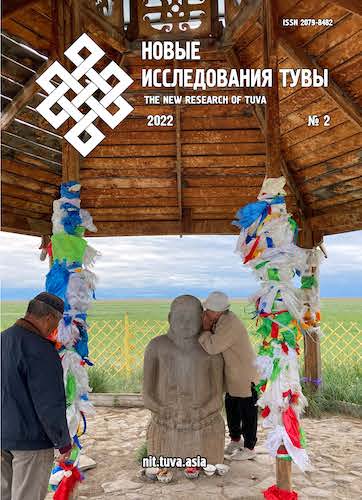Vocational choices of secondary school graduates in the capitals of Tuva, Altai and Khakassia as a basis of building human capital in the region (2021)
DOI:
https://doi.org/10.25178/nit.2022.2.14Keywords:
vocational choice; secondary school graduate; human capital; Republic of Tuva; Republic of Altai; Republic of KhakassiaAbstract
The article reviews the outcomes of a sociological survey offered in 2021 to secondary school graduates in three regions of Russia, who were asked about their priorities in vocational choices. The questionnaires filled by students of 9th and 11th grade in the republics of Tuva, Altai and Khakassia (1087 respondents all in all, in a multiround sampling) formed the empirical basis of our study.
The issue of whether ethnicity is a factor which informs vocational and motivational choices among school graduates in the republics of Altai, Tuva and Khakassia came up largely negative. The distinctions observed have more to do with the regions’ social and economic development.
A special focus was made on how respondents plan to choose a region for their employment to come. These choices are important since they reveal whether school graduates wants to stay in the region they were born in, thus enriching its human capital, or to move to another region in hopes of a better employment. The study showed that 70% of the respondents would rather leave and not come back. This may in due time lead to a deficiency in young qualified professionals in the regional economy.
References
Anaiban, Z. V. and Tiukhteneva, S. P. (2008) Etnokul'turnaia adaptatsiia naseleniia Iuzhnoi Sibiri, (sovrem. period) [Ethnocultural adaptation of the population of Southern Siberia in the contemporary period]. Moscow, Institut Vostokovedeniia RAN. 217 p. (In Russ.).
Asochakov, V. A. (1983) Kul'turnoe stroitel'stvo v Khakasii (1917–1937) [Cultural construction in Khakassia (1917–1937)]. Abakan, Khakass branch of the Krasnoyarsk Book Publishing House. 180 p. (In Russ.).
Balakina, G. F. and Anaiban, Z. V. (1995) Sovremennaia Tuva: sotsiokul'turnye i etnicheskie protsessy [Contemporary Tuva: Socio-cultural and ethnic processes]. Novosibirsk, Nauka Publ. 137 p. (In Russ.).
Balakina, G. F. and Kylgydai, A. Ch. (2015) Etnoregional'nye modeli adaptatsii k rynku truda v Tuve [Ethno-regional models of adaptation to the labour market in Tuva]. Kyzyl, TuvIKOPR SO RAN. 160 p. (In Russ.).
Baturina, E. V. (2014) Osobennosti professional'nogo samoopredeleniia obuchaiushchikhsia osnovnogo obshchego i srednego professional'nogo obrazovaniia v Respublike Khakasiia [Features of professional self-determination of students of basic general and secondary vocational education in the Republic of Khakassia]. In: Professional'noe obrazovanie i zaniatost' molodezhi: XXI vek. Sistema professional'nogo obrazovaniia v usloviiakh modernizatsii [Vocational education and youth employment: the XXI century. The system of vocational education in the conditions of modernization] / ed. by E. L. Rudneva. Kemerovo, Publishing house of the Kuzbass Institute for the Development of Vocational Education. 232 p. Pp. 104–107. (In Russ.).
Bobrovskii, O. N. (2014) Narodnoe obrazovanie v Khakasii [Public education in Khakassia]. Abakan, Khakass Book Publishing House. 72 p. (In Russ.).
Borgoiakov, S. A. (2009) Professional'noe obrazovanie Khakasii: problemy stanovleniia [Vocational education in Khakassia: problems of formation]. Professional'noe obrazovanie v Rossii i za rubezhom, no. 1, pp. 49–53. (In Russ.).
Dabiev, D. F. (2018) Professional'nye predpochteniia naseleniia Tuvy v kontekste ekonomicheskoi kul'tury [Career preferences of Tuva population in the context of economic culture]. New Research of Tuva, no. 2, pp. 132–148. (In Russ.). DOI: https://www.doi.org/10.25178/nit.2018.2.7
D'iachenko, N. S. (2021) Otsenka kachestva professional'nykh kompetentsii obuchaiushchikhsia v organizatsiiakh srednego professional'nogo obrazovaniia v usloviiakh standartov Worldskills Russia [Assessment of the quality of professional competencies of students in secondary vocational education organizations under the conditions of Worldskills Russia standards]. In: Podgotovka budushchikh pedagogov k professional'noi deiatel'nosti v usloviiakh tsifrovizatsii: otechestvennyi i zarubezhnyi opyt [Preparation of future teachers for professional activity in the conditions of digitalization: domestic and foreign experience]. Proceedings of a Research and Practical Conference / ed. by V. A. Adol'f. Krasnoiarsk, Krasnoyarsk State Pedagogical University named after V. P. Astafyev. 151 p. Pp. 25–28. (In Russ.).
Kylgydai, A. Ch. and Oidup, T. M. (2020) Professional'naia orientatsiia vypusknikov shkol v Respublike Tyva [Professional Orientation of School Graduates in the Context of Socio-Economic Transformations: A Sociological Analysis]. Sotsiologicheskie issledovaniia, no. 4, pp. 149–153. (In Russ.). DOI: https://www.doi.org/10.31857/S013216250009162-1
Mokhov, A. N. and Mokhova, L. A. (2009) Kratkie ocherki istorii narodnogo obrazovaniia Khakasii [Brief essays on the history of public education in Khakassia]. Abakan, Khakass Book Publishing House. 209 p. (In Russ.).
Nagruzov, D. I. (1968) Razvitie nauki, vysshego i srednego spetsial'nogo obrazovaniia v Khakasii [Development of science, higher and secondary special education in Khakassia]. In: Voprosy sotsial'no-ekonomicheskogo razvitiia Khakasii (istoriia, ekonomika, kul'tura, nauka) [Issues of socio-economic development of Khakassia: history, economy, culture, science] / ed. by S. P. Ulturgashev. Abakan, Khakass branch of the Krasnoyarsk Book Publishing House. 180 p. Pp. 123–140. (In Russ.).
Oidup, T. M. and Kylgydai, A. Ch. (2011) Professional'nye predpochteniia uchashchikhsia vypusknykh klassov obshcheobrazovatel'nykh shkol g. Kyzyla (po rezul'tatam sotsiologicheskogo issledovaniia) [Professional preferences of graduate class students in Kyzyl’s schools (results of sociological research)]. New Research of Tuva, no. 1, pp. 89–103. (In Russ.).
Oidup, T. M. and Kylgydai, A. Ch. (2021) Vypuskniki shkol kak osnova chelovecheskogo kapitala regiona (na primere Respubliki Tyva) [School graduates as the basis of the human capital of the region: the case of the Republic of Tuva]. Bulletin of the Institute of Sociology, vol. 12, no. 3, pp. 176–188. (In Russ.). DOI: https://www.doi.org/10.19181/vis.2021.12.3.743
Razvitie chelovecheskogo kapitala territorii: organizatsionno-ekonomicheskie mekhanizmy [Development of human capital in various territories: organizational and economic mechanisms] (2011) / ed. by E. A. Muzychenko. Novosibirsk, SibAGS Publ. 240 p. (In Russ.).
Sotsial'no-stratifikatsionnye protsessy v Respublike Tyva [Socio-stratification processes in the Republic of Tuva] (2020) / Z. T. Golenkova et al. ; ed. by Z. T. Golenkova, Yu. V. Goliusova and P. E. Sushko. Moscow ; Kyzyl, FCTAS RAS. 128 p. (In Russ.). DOI: https://doi.org/10.19181/monogr.978-5-89697-332-4.2020
Tonzherakova, A. A. (2012) Reformirovanie sistemy professional'nogo obrazovaniia Respubliki Altai [Reforming the vocational education system of the Altai Republic]. Uroven' zhizni naseleniia regionov Rossii, no. 6 (172), pp. 67–70. (In Russ.).
Tonzherakova, A. A. (2013) Usloviia formirovaniia i faktorov razvitiia sovremennoi regional'noi sistemy professional'nogo obrazovaniia [Conditions of shaping and developing of the contemporary regional system of vocational education]. Mir nauki, kul'tury, obrazovaniia, no. 1 (38), pp. 318–320. (In Russ.).
Chelovecheskii kapital: teoriia, istoricheskii opyt i perspektivy razvitiia [Human capital: theory, historical experience and development prospects] (2017) / ed. by I. N. Shapkina. Moscow, RUSAINS. 282 p. (In Russ.).
Eneeva, L. A. and Zhernosenko, I. A. (2013) Innovatsionnye shkoly regionov Rossii: kul'turotvorcheskaia model' [Innovative Schools of Russian Regions: Cultural model]. Barnaul, S. S. Zhernosenko Publ. 133 p. (In Russ.).
Published
How to Cite
For citation:
Oydup T. M. and Troshkina I. N. Professional’nye predpochteniia vypusknikov shkol stolits respublik Tyva, Altaia i Khakasii kak osnova formirovaniia chelovecheskogo kapitala regionov (2021 g.) [Vocational choices of secondary school graduates in the capitals of Tuva, Altai and Khakassia as a basis of building human capital in the region (2021)]. New Research of Tuva, 2022, no. 2, pp. 198-210. (In Russ.). DOI: https://www.doi.org/10.25178/nit.2022.2.14
Issue
Section

This work is licensed under a Creative Commons Attribution-NonCommercial 4.0 International License.

Author(s) license holder(s) grant rights for their work to the journal (grantee of a license) under the simple non-exclusive open license in accordance with Art. 1286.1 «Open license for a research work, work of literature or fine arts», Civil Code of the Russian Federation.
New Research of Tuva publishes articles under the Creative Commons Attribution-NonCommercial license (CC BY-NC).
Since it is an open license, author(s) reserve the right to upload the article to their institutional repository, submit it to another journal (if it allows republications), or republish it on their own website (in full, or in part).
However, several conditions apply here:
a) The republished version must always contain the name(s) and affiliation(s) of the author(s), the original title and the hyperlink to the original version on the New Research of Tuva website;
b) It must be in open access, free of charge, and no category of readers must be in any way whatsoever advantaged over general readership.
c) should the contribution be submitted elsewhere by its author(s) without substantial modification (30% or more of original text unchanged), the body of the article should contain a disclaimer that the original version was published in New Research of Tuva (with a link to the respective page)
The CC-BY-NC is a non-revocable license which applies worldwide and lasts for the duration of the work’s copyright.










